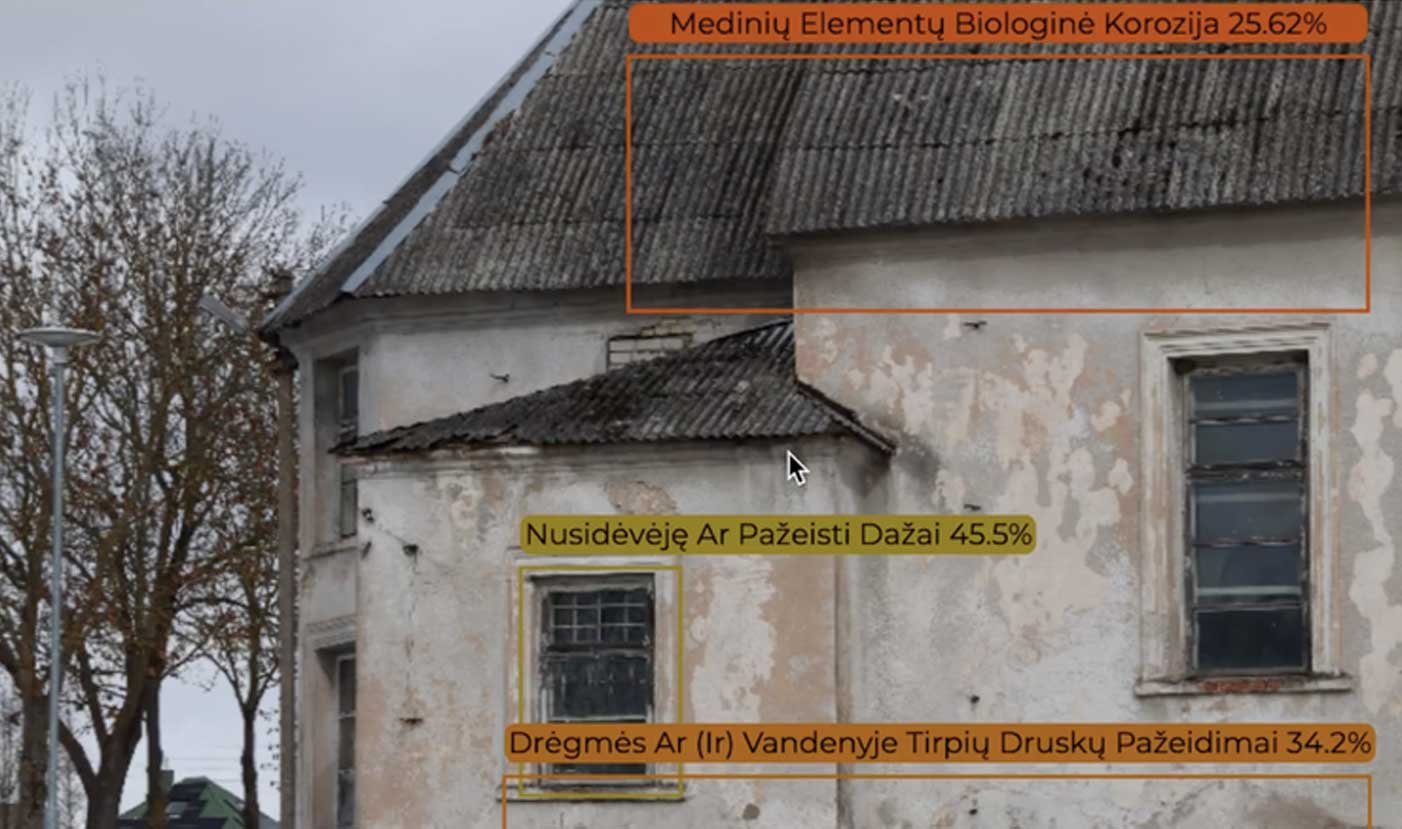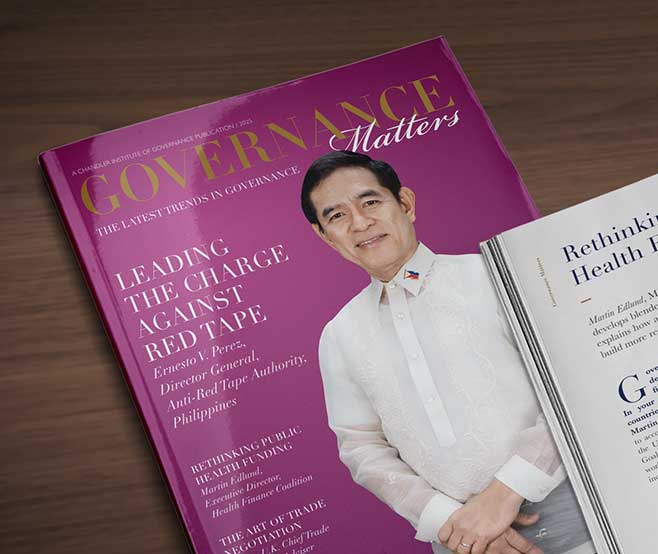Can Good Governance Be Measured?
Chandler Institute of Governance’s Executive Director Wu Wei Neng says there is no perfect way to measure governance — but the practical use of data can paint a powerful picture.
Lorem ipsum dolor sit amet, consectetur adipiscing elit, sed do eiusmod tempor incididunt ut labore et dolore magna aliqua. Ut enim ad minim veniam, quis nostrud exercitation ullamco laboris nisi ut aliquip ex ea commodo consequat. Duis aute irure dolor in reprehenderit in voluptate velit esse cillum dolore eu fugiat nulla pariatur.
Heading 1
Heading 2
Heading 3
Heading 4
Heading 5
Heading 6
Lorem ipsum dolor sit amet, consectetur adipiscing elit, sed do eiusmod tempor incididunt ut labore et dolore magna aliqua. Ut enim ad minim veniam, quis nostrud exercitation ullamco laboris nisi ut aliquip ex ea commodo consequat. Duis aute irure dolor in reprehenderit in voluptate velit esse cillum dolore eu fugiat nulla pariatur.
Block quote
Heading 6
Ordered list
- Item 1
- Item 2
- Item 3
Unordered list
- Item A
- Item B
- Item C
Bold text
Emphasis
Superscript
Subscript
Measuring What Matters
What is the role of government? Does it include ensuring that everybody has a home to live in? Or taking on the ownership and management of strategic sectors like healthcare and energy? Should governments be responsible for rescuing large troubled companies in times of economic crisis? Or should their role be limited to providing national defence and basic infrastructure?
As the world responds unevenly to a crippling global pandemic and the resulting economic fallout, the role of governments is as contested today as it was in the times of Confucius and Plato, Keynes and Hayek. If we cannot fully agree on the role of government, there will never be agreement on how best to measure the success and performance of governments.
Even if we could define governance, to what extent can numbers ever capture the spirit of this definition? Are certain metrics equally relevant for low-income countries and high-income ones? Which offer more insight: expert assessments or perception surveys?
If we agree that governance matters, then we need reasonable and practical ways to measure the quality of national governance.
There are no simple answers, but this should not result in paralysis and inaction on the part of those who care about good government. There are aspects of governance that most people agree are important, such as educating children, preventing murders, and managing inflation, that can also be tracked meaningfully. This can bring clarity to conversations that otherwise risk being riddled with generalisations and clichés. And as anyone who has ever tracked their progress on fitness or expenditures can attest, measuring something is an important first step toward progress. If we agree that governance matters, then we need reasonable and practical ways to measure the quality of national governance.

What is the Chandler Good Government Index?
Motivated by our belief that measurement can spark conversations and change, we launched the Chandler Good Government Index (CGGI) in April 2021. The Index analyses the capabilities and effectiveness of 104 governments, whose countries’ citizens nearly 90% of the world’s population. This makes it the most comprehensive index of its kind.
Compiled from 50 public data sources, the CGGI issues each country an overall score, which is determined by a country’s performance across what we call the seven pillars of good governance [see table above]. The score for each pillar is determined by a number of equally-weighted indicators specific to that pillar.
The CGGI was the product of a two-year journey. We connected with government practitioners from across six continents, and worked with a global network of experts and advisors to sharpen and challenge our thinking. We assessed hundreds of potential metrics and sifted through thousands of pages of reports, analyses, and data sources.
Before starting this journey, however, we had to ask a fundamental question: why create our own index?
What Makes the Chandler Good Government Index Distinctive
The indicators we decided to include — and just as importantly, to not include — in the Index were shaped by our own experience working in and advising the public sector. Our choices were based on interviews with government practitioners and civil servants from more than 20 countries. These conversations produced surprising alignment on the key components of good governance, even though the respondents were from countries with vastly different income levels, cultures, and challenges. Despite the debates, people currently working in government identified a core set of capabilities and factors required for any government to be effective. We distilled the lived experiences and wisdom from these practitioners to design the backbone of the Index.
A central tenet of our work at CIG — our training programmes, research initiatives, and advisory projects — is practicality. We wanted the Index to be a practical tool, which is why the Index focuses on government capabilities, rather than outcomes alone. Governments aren’t always fully in control of outcomes — natural disasters strike, new regimes inherit the legacy of outcomes based on previous leaders’ decisions — but they can always take steps to develop their skills and capabilities. Six of the Index’s seven pillars, and 25 of its 34 indicators, focus on concrete capabilities, ranging from data analysis to corruption control, investment promotion to public consultation. These skills and competencies can be tracked and monitored, but more importantly, can be learnt and developed.
While the Index is capability-focused, it also looks at a basket of nine important outcomes, from education to healthcare, income inequality to social mobility. The reason we included these outcomes is simple: they clearly matter in assessing a government’s efficacy. A government that has impressive capabilities, but does not utilise these capabilities to generate outcomes that people care about, is not realising its full potential. In our analysis, a strong correlation emerged between the strength of a government’s capabilities and the outcomes it delivered, suggesting that bolstering a government’s capabilities might be a powerful investment in improving people’s everyday lives.
The Index measures the effectiveness and the capability of governments — it does not judge the political ideology and form of their government. The Index, like CIG itself, is not affiliated with any national government or political party, and does not represent any partisan or commercial interests. If you were to imagine each country on the Index as a car, the Index evaluates its quality — whether it has power steering, whether its brakes are working, its mileage per gallon. But we don’t make judgements on whether the car should turn right or left — we believe that such assessments are best left to the people and businesses within each country.
The CGGI includes capabilities that are not common in governance indices. Our experience and the feedback of practitioners within governments show us that these capabilities are vital. In the sixth pillar, for instance, one indicator is ‘nation brand’, defined as the coherence of a country’s national tourism promotion with its image and appeal to a variety of non-commercial stakeholders. We included it because governments that have the platforms and capabilities to build and communicate a clear narrative and brand story will be more equipped to achieve their policy goals, engage stakeholders, investors, and tourists, and provide better services — particularly in a time of growing hostility and polarisation.
Informing and Advancing the Governance Conversation
Since launching the CGGI, we’ve heard from government officials from some of the highest-scoring countries, those in the middle, and those in the lower third. Some wanted to understand the data and results better, while others were interested in how they might measure their own performance. The Index rankings have been reported by media outlets, discussed by radio hosts, and debated on social media by citizens. We have engaged with experts and academics to discuss our methodology. All of these have been welcome developments, and an important part of our goal to spark conversations, at all levels, about governance.
These are the kinds of conversations we are committed to continue. The Index will be updated annually so governments can continue to benchmark their performance and understand, in practical terms, where they are effective and where they can do better. We hope that citizens, investors, development partners, and other stakeholders will also find this information useful. We are also eager to track over time how targeted actions by governments result in sustained, long-term improvements in specific capabilities.


Rebuilding and Restoring Trust through Good Governance
As we prepare to update the CGGI in 2022, we are mindful of the ‘governance gap’ in many parts of the world — a widening divergence between what populations expect from their governments, and what their governments deliver. This governance gap is worsened by falling trust in many governments worldwide. As public polling in a number of countries reveals, trust in public institutions has weakened during the COVID-19 pandemic, after an initial uptick. Falling marketplace and public trust leads to a vicious cycle: low trust undermines the ability of the state to govern, which in turn reduces the effectiveness of public policies and services, further diminishing trust over time.

Our core belief at the CIG is that this downward spiral can be stopped, and reversed. Trust is built when governments perform well — and this trust, in turn, helps governments perform even better. While history does not furnish any simple formulas for good governance, it does offer examples of governments improving the quality of services they deliver, of stamping out corruption, and implementing thoughtful structures and policies. Progress is possible, and governments can strengthen their capabilities through good investments in talent, systems and training, and by learning from the experiences of others. By offering a new way for governments to understand and benchmark their capabilities and performance, we hope the CGGI sparks honest conversations about opportunities for progress.
Trust is built when governments perform well — and this trust, in turn, helps governments perform even better.




Heading 1
Heading 2
Heading 3
Heading 4
Heading 5
Heading 6
Lorem ipsum dolor sit amet, consectetur adipiscing elit, sed do eiusmod tempor incididunt ut labore et dolore magna aliqua. Ut enim ad minim veniam, quis nostrud exercitation ullamco laboris nisi ut aliquip ex ea commodo consequat. Duis aute irure dolor in reprehenderit in voluptate velit esse cillum dolore eu fugiat nulla pariatur.

Block quote
Ordered list
- Item 1
- Item 2
- Item 3
Unordered list
- Item A
- Item B
- Item C
Bold text
Emphasis
Superscript
Subscript
Lorem ipsum dolor sit amet, consectetur adipiscing elit, sed do eiusmod tempor incididunt ut labore et dolore magna aliqua. Ut enim ad minim veniam, quis nostrud exercitation ullamco laboris nisi ut aliquip ex ea commodo consequat. Duis aute irure dolor in reprehenderit in voluptate velit esse cillum dolore eu fugiat nulla pariatur.
Endnotes
- Item 1
- Item 2
- Item 3


Wu Wei Neng is the Executive Director of the Chandler Institute of Governance, an international non-profit organisation headquartered in Singapore. CIG supports government leaders and public officers in multiple countries, through training, research and partnerships. He currently holds adjunct appointments with the Centre for Liveable Cities and the Singapore Civil Service College. Prior to this, he served in Singapore’s Ministry of Trade and Industry and Ministry of Defence.
Lorem ipsum dolor sit amet, consectetur adipiscing elit, sed do eiusmod tempor incididunt ut labore et dolore magna aliqua. Ut enim ad minim veniam, quis nostrud exercitation ullamco laboris nisi ut aliquip ex ea commodo consequat. Duis aute irure dolor in reprehenderit in voluptate velit esse cillum dolore eu fugiat nulla pariatur.













